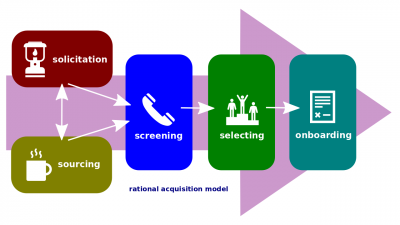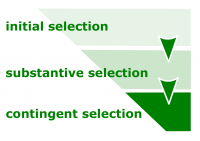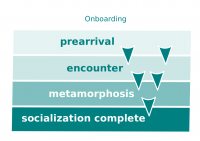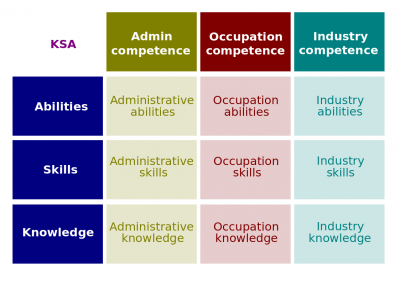Difference between revisions of "Book of Recruitment"
(→Recruitment Needs) |
|||
| Line 1: | Line 1: | ||
| − | [[Introduction to Recruitment]] (hereinafter, the '' | + | [[Introduction to Recruitment]] (hereinafter, the ''Session'') is a learning session introducing the learners to [[recruitment]] and related topics. The ''Session'' is the third of eight sessions of '''[[WorldOpp Orientation]]''' (hereinafter, the ''Orientation''). |
==Outline== | ==Outline== | ||
| − | ''[[Introduction to Employment]] is the predecessor | + | ''[[Introduction to Employment]] is the predecessor session.'' |
===Recruitment Essentials=== | ===Recruitment Essentials=== | ||
| Line 61: | Line 61: | ||
:*'''[[Referral fee]]''' ([[finder's fee]]). A commission paid to an intermediary or the facilitator of a [[business transaction]]. This fee is rewarded because the intermediary discovered the deal and brought it forth to interested parties. Depending on the circumstance, this fee can be paid by either the transaction's buyer or seller. In the [[United States]], either an [[employer]] or a [[recruiter]] may pay the fee for finding a right [[employment candidate]]. For instance, an [[employer]] may pay the fee to its current employee instead of paying the [[placement fee]] to a [[contingency recruiter]]. Or a [[contingency recruiter]] may pay the fee from its [[placement fee]], etc.</div> | :*'''[[Referral fee]]''' ([[finder's fee]]). A commission paid to an intermediary or the facilitator of a [[business transaction]]. This fee is rewarded because the intermediary discovered the deal and brought it forth to interested parties. Depending on the circumstance, this fee can be paid by either the transaction's buyer or seller. In the [[United States]], either an [[employer]] or a [[recruiter]] may pay the fee for finding a right [[employment candidate]]. For instance, an [[employer]] may pay the fee to its current employee instead of paying the [[placement fee]] to a [[contingency recruiter]]. Or a [[contingency recruiter]] may pay the fee from its [[placement fee]], etc.</div> | ||
| − | ''[[Introduction to Careers]] is the successor | + | ''[[Introduction to Careers]] is the successor session.'' |
==Materials== | ==Materials== | ||
===Recorded audio=== | ===Recorded audio=== | ||
===Recorded video=== | ===Recorded video=== | ||
| − | :*https://youtu.be/Emr8exlqUfc ( | + | :*https://youtu.be/Emr8exlqUfc (session preview) |
== Video Text== | == Video Text== | ||
Revision as of 20:53, 31 January 2019
Introduction to Recruitment (hereinafter, the Session) is a learning session introducing the learners to recruitment and related topics. The Session is the third of eight sessions of WorldOpp Orientation (hereinafter, the Orientation).
Contents
Outline
Introduction to Employment is the predecessor session.
Recruitment Essentials
- Main wikipage: Recruitment Essentials; video (4:44)
- Recruitment. The process of filling job vacancies with people.
- Source selection. The process of selecting sources whose resources, credibility, and performance is expected to meet the contract and/or procurement objectives within a competitive range of cost.
- Onboarding. The mechanism of integrating a new employee into the enterprise and its culture.
Recruitment Needs
- Main wikipage: Recruitment Needs; video (4:17)
- Recruitment need.
- Job analysis. An assessment that defines jobs and the behaviors necessary to perform them.
- Job description. A written statement that describes a job.
- Credential creep. The process of inflation of the minimum credentials required for a given job and the simultaneous devaluation of the value of diplomas and degrees.
- KSA (or knowledge, skills, and abilities). Description of work-related competence in a series of narrative statements. KSAs are particularly required when applying to United States Federal Government job openings. KSAs are used to determine, along with résumés, who the best applicants are when several candidates qualify for a job.
- Work-related knowledge. A body of knowledge applied directly to a particular occupation and/or industry.
- Work-related skill. A set of skills applied directly to a particular occupation and/or industry.
- Work-related ability. A set of capacities applied directly to a particular occupation and/or industry.
Search for Job Candidates
- Main wikipage: Search for Job Candidates; video (2:44)
- Sourcing. Enterprise efforts undertaken in order to identify and list possible sources, internal and/or external, that are potentially capable to provide the specified organizational resources, as well as potential data sources who are able to provide relevant information on specific acquisitions.
- ERP human resources. Any system for human resource management that is integrated into a larger enterprise management system. Usually, both systems are built on enterprise resource planning software.
- In-network message. A message sent to the members of a network.
- Employment resource. Any resource, usually web-based, that allows for matching employers and employment candidates.
Screening of Job Candidates
- Main wikipage: Screening of Job Candidates; video (5:02)
- Source screening. (1) The evaluation or investigation of a source as part of a methodical survey, to assess suitability for a particular role or purpose; (2) Techniques used for source consideration, reviewing, analyzing, ranking, and selecting the best alternatives for the proposed action.
- Job interview (more narrowly, employment interview). An interview consisting of a conversation between a job applicant and one or more representatives of an employer which is conducted to (a) assess whether the applicant may be hired and, possibly, (b) negotiate conditions of this hiring.
- Situational judgment test. A substantive selection test that asks applicants how they would perform in a variety of job situations; the answers are then compared to the answers of high-performing employees.
- Work sample test. A hands-on simulation of part or all of the work that applicants for routine jobs must perform.
- Assessment center. An off-site place where candidates are given a set of performance simulation tests designed to evaluate their managerial potential.
Recruiters' Essentials
- Main wikipage: Recruiters' Essentials; video (6:10)
- Recruitment service. Any service related to recruitment.
- Recruiter. A legal entity whose business is to enlist or enroll people as employees, students, or as members of an organization.
- Retained recruiter. A recruiter who is paid for the time spent while recruiting regardless of the fact whether qualified sources are identified, hired, or not.
- Contingency recruiter. A recruiter who is paid only when qualified sources are identified and hired.
- Hiring manager. A representative of the employer responsible for hiring one or more employees to fill open positions. That manager may work for that employer as an employee, be hired as an independent contractor, or be an employee of another recruiter.
- Outsourced recruitment. The whole recruitment or its part that is outsourced to another legal entity, either an individual or an organization.
- Employment agency. Any entity that matches employers and employment candidates.
- Staffing firm. Any entity that provides employers with their staffers.
- Temporary staffing provider. Any entity that provides employers with temporary staffers.
- Headhunter (executive search provider or headhunting provider). A specialized recruitment service designed to provide employers with highly qualified employment candidates especially for senior-level and executive jobs.
- Recruitment fee. The fee that an employer agrees to pay as a compensation for sourcing, screening, and, sometimes, selecting one or more employment candidates.
- Placement fee. The fee that an employer agrees to pay a contingency recruiter as a compensation for placing one or more employment candidates into specified employment. In the United States, those fees are typically collected as a percentage of the annual salary of the hired, ranging between 20% to 33%.
- Referral fee (finder's fee). A commission paid to an intermediary or the facilitator of a business transaction. This fee is rewarded because the intermediary discovered the deal and brought it forth to interested parties. Depending on the circumstance, this fee can be paid by either the transaction's buyer or seller. In the United States, either an employer or a recruiter may pay the fee for finding a right employment candidate. For instance, an employer may pay the fee to its current employee instead of paying the placement fee to a contingency recruiter. Or a contingency recruiter may pay the fee from its placement fee, etc.
Introduction to Careers is the successor session.
Materials
Recorded audio
Recorded video
- https://youtu.be/Emr8exlqUfc (session preview)



